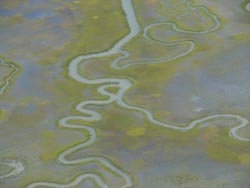Salt Marsh Carbon May Play Role in Slowing Climate Warming

Fariss Samarrai<br> <br>Aerial view of a salt marsh at Virginia's Eastern Shore.<br>
Carbon dioxide is the predominant so-called “greenhouse gas” that acts as sort of an atmospheric blanket, trapping the Earth’s heat. Over time, an abundance of carbon dioxide can change the global climate, according to generally accepted scientific theory. A warmer climate melts polar ice, causing sea levels to rise.
A large portion of the carbon dioxide in the atmosphere is produced by human activities, primarily the burning of fossil fuels to energize a rapidly growing world human population.
“We predict that marshes will absorb some of that carbon dioxide, and if other coastal ecosystems – such as seagrasses and mangroves – respond similarly, there might be a little less warming,” said the study’s lead author, Matt Kirwan, a research assistant professor of environmental sciences in the College of Arts & Sciences.
Salt marshes, made up primarily of grasses, are important coastal ecosystems, helping to protect shorelines from storms and providing habitat for a diverse range of wildlife, from birds to mammals, shell- and fin-fishes and mollusks. They also build up coastal elevations by trapping sediment during floods, and produce new soil from roots and decaying organic matter.
“One of the cool things about salt marshes is that they are perhaps the best example of an ecosystem that actually depends on carbon accumulation to survive climate change: The accumulation of roots in the soil builds their elevation, keeping the plants above the water,” Kirwan said.
Salt marshes store enormous quantities of carbon, essential to plant productivity, by, in essence, breathing in the atmospheric carbon and then using it to grow, flourish and increase the height of the soil. Even as the grasses die, the carbon remains trapped in the sediment. The researchers’ model predicts that under faster sea-level rise rates, salt marshes could bury up to four times as much carbon as they do now.
“Our work indicates that the value of these ecosystems in capturing atmospheric carbon might become much more important in the future, as the climate warms,” Kirwan said.
But the study also shows that marshes can survive only moderate rates of sea level rise. If seas rise too quickly, the marshes could not increase their elevations at a rate rapid enough to stay above the rising water. And if marshes were to be overcome by fast-rising seas, they no longer could provide the carbon storage capacity that otherwise would help slow climate warming and the resulting rising water.
“At fast levels of sea level rise, no realistic amount of carbon accumulation will help them survive,” Kirwan noted.
Kirwan and his co-author, Simon Mudd, a geosciences researcher at the University of Edinburgh in Scotland, used computer models to predict salt marsh growth rates under different climate change and sea-level scenarios.
The United States Geological Survey’s Global Change Research Program supported the research.
Media Contact
More Information:
http://www.virginia.eduAll latest news from the category: Earth Sciences
Earth Sciences (also referred to as Geosciences), which deals with basic issues surrounding our planet, plays a vital role in the area of energy and raw materials supply.
Earth Sciences comprises subjects such as geology, geography, geological informatics, paleontology, mineralogy, petrography, crystallography, geophysics, geodesy, glaciology, cartography, photogrammetry, meteorology and seismology, early-warning systems, earthquake research and polar research.
Newest articles

“Nanostitches” enable lighter and tougher composite materials
In research that may lead to next-generation airplanes and spacecraft, MIT engineers used carbon nanotubes to prevent cracking in multilayered composites. To save on fuel and reduce aircraft emissions, engineers…

Trash to treasure
Researchers turn metal waste into catalyst for hydrogen. Scientists have found a way to transform metal waste into a highly efficient catalyst to make hydrogen from water, a discovery that…

Real-time detection of infectious disease viruses
… by searching for molecular fingerprinting. A research team consisting of Professor Kyoung-Duck Park and Taeyoung Moon and Huitae Joo, PhD candidates, from the Department of Physics at Pohang University…




















